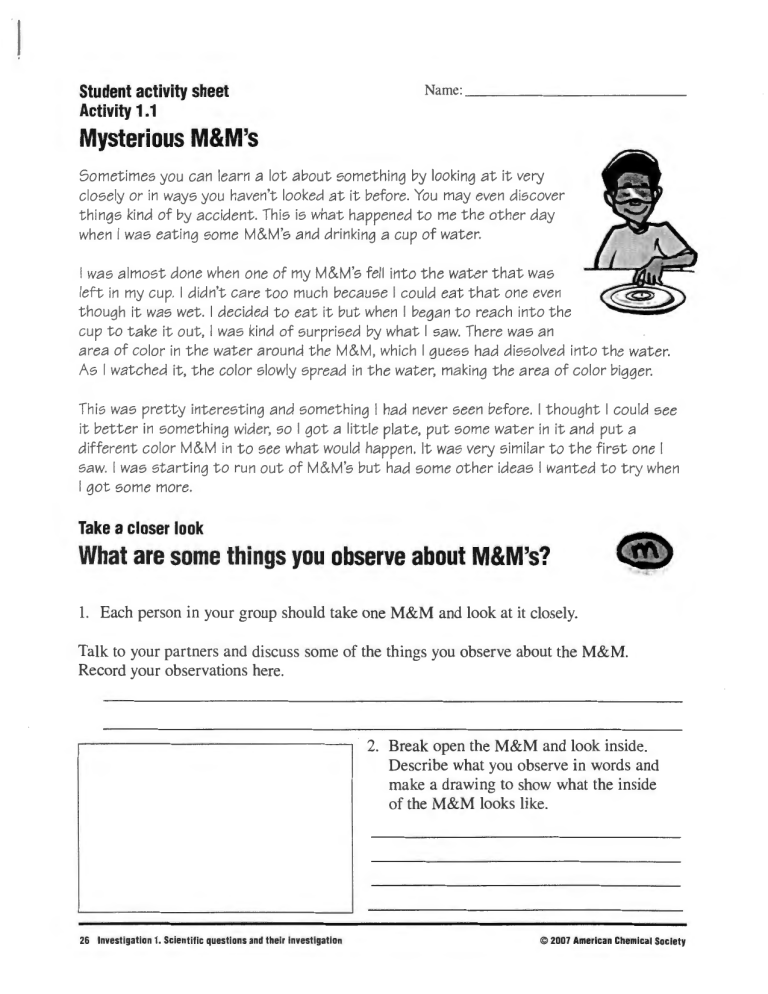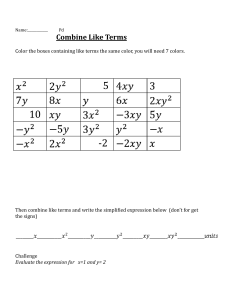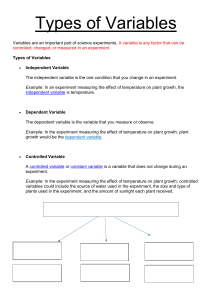
Student activity sheet Activity 1.1 Name: _ _ __ _ _ _ _ _ _ __ Mysterious M&M's Sometimes you can learn a lot about something by looking at it very closely or in ways you haven't looked at it before. You may even discover things kind of by accident. This is what happened to me the other day when I was eating some M&M's and drinking a cup of wat er. I was almost done when one of my M&M's fell into the water that was left in my cup. I didn't care too much because I could eat that one even though it was wet. I decided to eat it but when I began to reach into the cup to take it out, I was kind of surprised by what I saw. There was an area of color in the water around the M&M, which I guess had dissolved into the water. As I watched it, the color slowly spread in the water, making the area of color bigger. This was pretty interesting and something I had never seen before. I thought I could see it better in something wider, so I got a little plate, put some water in it and put a different color M&M in to see what would happen. It was very similar to the first one I saw. I was starting to run out of M&M's but had some other ideas I wanted to try when I got some more. Take a closer look What are some things you observe about M&M's? 1. Each person in your group should take one M&M and look at it closely. Talk to your partners and discuss some of the things you observe about the M&M. Record your observations here. 2. Break open the M&M and look inside. Describe what you observe in words and make a drawing to show what the inside of the M&M looks like. 26 Investi gation 1. Scientific questi ons and the ir investigati on © 2007 American Chemical Society I Name: _ _ __ _ __ _ _ __ _ Student activity sheet Activity 1.1 Mysterious M&M's (continued) Try this! Try placing an M&M in water to get a better idea of what the student in the reading saw. What happens when one M&M is placed in water? Procedure 1. Pour room-temperature water into a white plastic or foam plate so that it covers the bottom of the entire plate. 2. Once the water has settled, place 1 M&M in the center of the plate. Be careful to keep the water and M&M as still as possible. Observe for about 1 minute. 3. Record your observations with words and an illustration. Plate © 2007 American Chemical Society Investigation 1. Scientific questi ons and their investigation 27 Student activity sheet Activity 1.2 Name : _ _ _ _ _ __ _ __ __ Racing M&M colors Do some M&M colors dissolve in water faster than others? Plan your experiment 1. Plan an experiment you could do to find out whether some M&M colors dissolve in water faster than others. Write about your plan in the space below. 2. What will you do to make sure that your test is fair? Conduct your experiment 3. Do certain colors seem to move faster or slower than others? - - - - - - - - 4. If so, which ones? If not, what did you observe? _ _ _ _ _ _ _ _ _ _ _ __ Explain your observations 5. Did other groups have similar results? _ _ _ __ _ __ _ _ _ _ __ _ __ 6. Is there enough evidence from your experiments to conclude that a particular color of M&M moves faster in water than the others? - - - - - - - - - - - - - -- 32 Investigation 1. Scientifi c questions and their investigation © 2007 American Chemical Society Student activity sheet Activity 1.1 Name: ____________ Mysterious M&M's (continued) Questions you could investigate The color of M&M's, how many are in the plate, the temperature of the water, and the type of liquid the M&M's are placed in are variables that can be changed to do new experiments. 4. Look at the variables below. These variables can be changed to learn more about M&M colors in water. Write at least one question for each variable. Example: A. Variable-Color Question-Do certain M&M colors dissolve in water faster than others? B. Variable-Number of M&M's QuestionC. Variable-Temperature of water Question- D. Variable-Type of liquid QuestionE. What other variables and questions can you investigate? 28 Investigation 1. Scientific questions and their Investigation © 2007 American Chemical Society



